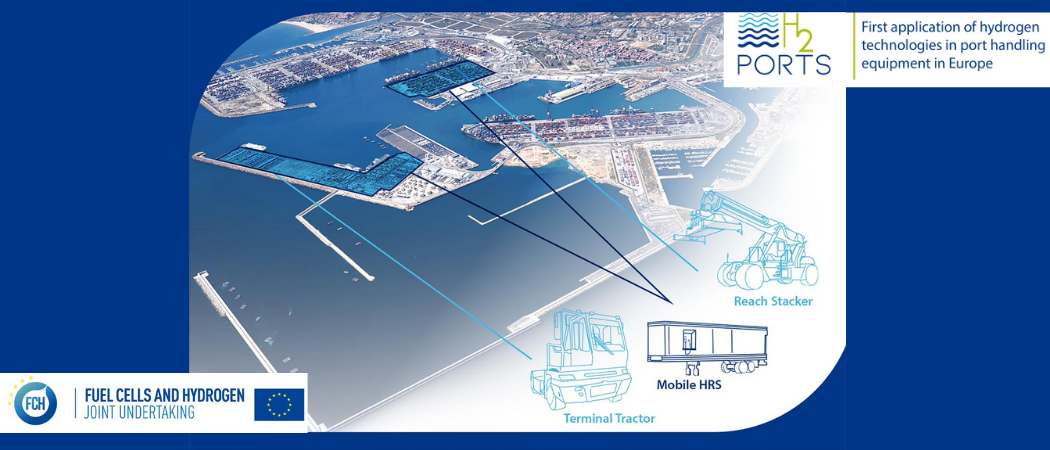The global transition to hydrogen as an energy source is well under way. Hydrogen is especially relevant for waterborne transport and associated logistics, which ultimately support the entire economy.

By Bart Biebuyck, Executive Director of the Fuel Cells and Hydrogen Joint Undertaking (FCH JU)
Hydrogen has the potential to profoundly transform logistics and transportation systems, providing a clean and efficient energy solution for machinery and vehicles. Ports are set to play a pivotal role in this hydrogen transformation.
Ports can be both drivers and beneficiaries of hydrogen technologies. With the right infrastructure and a supportive regulatory framework, ports can act as hydrogen hubs, delivering hydrogen as a fuel for shipping and other industries. Ports can also be users of hydrogen, as they move to decarbonise their own operations.
As a clean energy carrier, hydrogen promises to improve the quality of life for people everywhere, and could be a powerful key driver for job creation and economic welfare.
What is Europe doing to move the hydrogen transformation forward? The FCH JU has just published a call for tenders for the development of a ‘Study on Hydrogen in Ports and Industrial Coastal Areas’. For the European Union, this is a crucial next step in unleashing the hydrogen potential in ports.
Towards a European Hydrogen Ports Roadmap
The planned study will be a comprehensive assessment of the hydrogen demand in ports and industrial coastal areas, enabling the creation of a 'European Hydrogen Ports Roadmap'. It will also feature clear economic forecasts based on a variety of business models for the transition to renewable hydrogen in ports, while presenting new case studies and project concepts.
The objective is to provide new directions for research and innovation, guidance for regulation, codes and standards, and proposals on policy and regulation. The forthcoming study will also help create impetus for stakeholders to come together and take a long-term perspective on the hydrogen transition in ports. Finally, the study will be a centralised resource: It will form a Europe-wide hydrogen ports 'backbone' when combined with roadmaps and other materials created by individual ports
The analysis will feed into the work of the Global Hydrogen Ports Coalition, launched at the latest Clean Energy Ministerial (CEM12). This important international initiative brings together ports from around the world to work together on hydrogen technologies.
Funding the development of hydrogen solutions for ports
One of FCH JU's goals is to accelerate the uptake of hydrogen-based energy solutions in ports and coastal areas. To that end, the FCH JU-funded H2PORTS project will demonstrate and validate real, concrete, hydrogen-based solutions at the Port of Valencia in Spain. The project partners are testing a reach stacker at MSC Terminal Valencia, and a yard tractor at Valencia Terminal Europa. A new mobile hydrogen supply station has been specifically designed for use during the project. These innovative solutions are based on fuel cell technologies.
The first such trials to be carried out using hydrogen technologies in port-handling equipment in Europe, H2PORTS will run this equipment daily for two years in real operational situations.
Integrating ports into a hydrogen-based economy
Ports play an important role in Europe’s transport and logistics chain. Indeed, they serve as a mainstay for the whole economy. Initiatives, such as the HEAVENN project, which has led to the creation of the 'North Netherlands hydrogen valley', have already pointed to how ports systems can be integrated into a fully linked hydrogen-based economy.
HEAVENN, which also received funding from the FCH JU, provided a demonstration project that is serving as a blueprint for further developments. Concrete initiatives, such as the Zuid-Holland Hydrogen Valley, are building on the model established by this project. Home to Europe’s largest seaport, Zuid-Holland is aiming to become the EU’s hydrogen hub, where the import, use and transport of clean hydrogen coalesce.
Clean and efficient ports, logistics platforms and inland waterways are essential to maintaining the EU's competitive position in the world transport arena. To help bring about a wider and more rapid introduction of hydrogen as an alternative fuel at our ports, we invite all interested stakeholders and citizens to join us in this venture.
About the FCH JU
A unique public-private partnership, the FCH JU contributes to the development of sustainable and globally competitive FCH technology in Europe. By bringing together a wide range of industrial and scientific partners, it supports EU approaches on sustainable energy and transport, climate change and industrial competitiveness.
'One of FCH JU's important overarching goals is to accelerate the uptake of hydrogen-based energy solutions in ports and coastal areas.'
More info:
The Fuel Cells and Hydrogen Joint Undertaking
H2PORTS: https://www.fch.europa.eu/project/implementing-fuel-cells-and-hydrogen-technologies-ports





 A unique international forum for public research organisations and companies to connect their external engagement with strategic interests around their R&D system.
A unique international forum for public research organisations and companies to connect their external engagement with strategic interests around their R&D system.